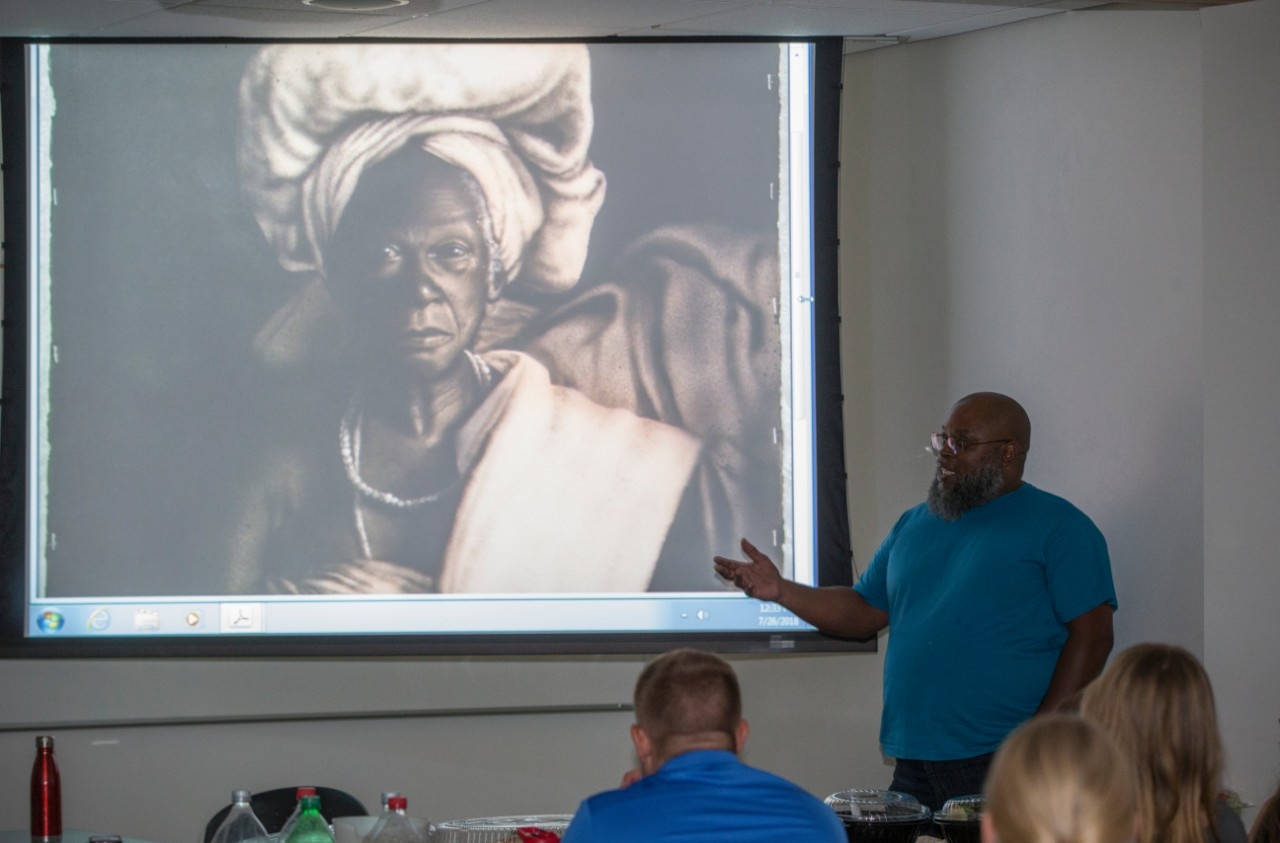Artist and musician Raymond Towler, who was freed from prison with help from the UC College of Law's Ohio Innocence Project, returned to UC to share his story with students. Towler spent 29 years in prison.
Exonerees inspire newest class of law students
UC College of Law students are working to free wrongfully convicted prisoners as part of the Ohio Innocence Project.
By Michael Miller
513-556-6757
Photos by Joseph Fuqua II/UC Creative Services
July 27, 2018
Raymond Towler, 61, said there is nothing he could have said or done to persuade police, prosecutors or a jury that they had the wrong man – that he was innocent – when he was sentenced to life in prison for the 1981 kidnapping and assault of two children in a Cleveland park.
Students and faculty at the University of Cincinnati’s College of Law believed in him and used new DNA-testing techniques in 2010 to prove conclusively that the U.S. Army veteran was not responsible for the crimes. To date, UC through its Ohio Innocence Project has helped free 27 defendants wrongfully convicted by the courts.
Towler and 10 other exonerees returned to UC in July to share their experiences, express their gratitude and inspire law students to keep working on behalf of other prisoners who are victims of circumstance or a fallible justice system.
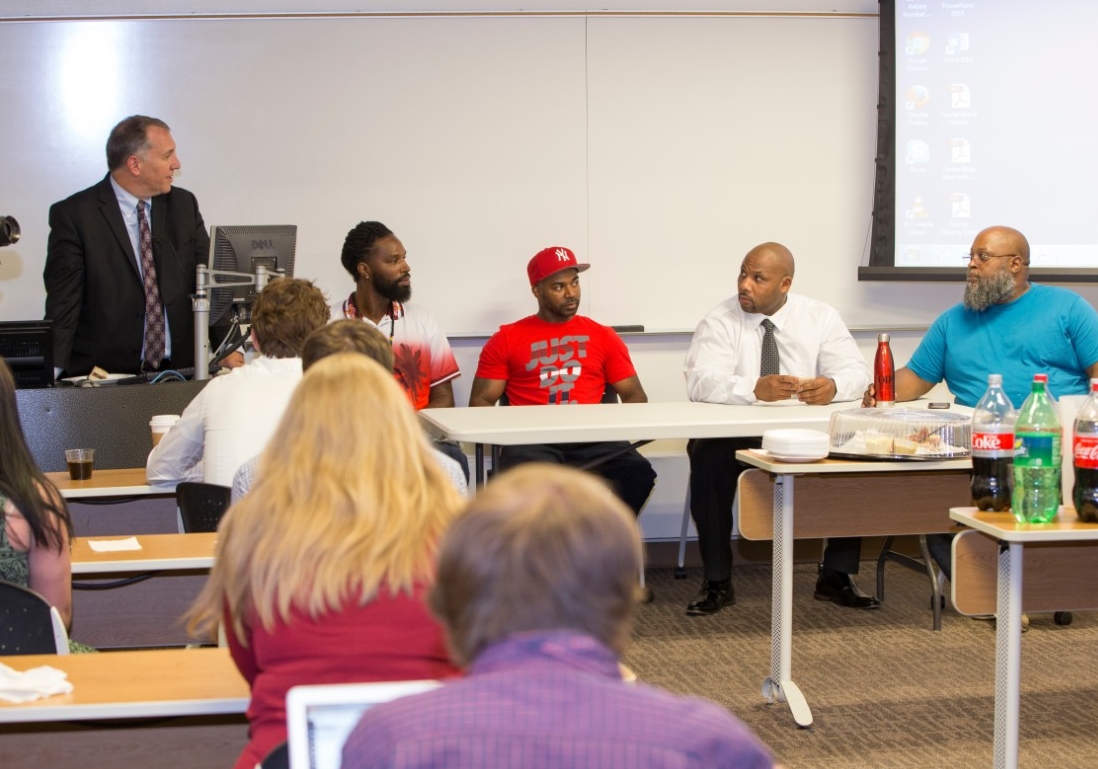
UC law professor Mark Godsey moderates a panel of exonerees who spoke to UC College of Law students.
Christopher Miller was freed in June after serving 17 years in prison for a kidnapping, robbery and assault he did not commit. UC’s lawyers were able to get a post-trial review of forensic evidence that determined that someone other than Miller was responsible.
Miller said he has spent time with family, traveling and readjusting to his new life and a world that has changed in big and small ways in the past two decades. When he was arrested, there was no social media such as Facebook or Twitter. It would be another five years before Apple released the first iPhone.
“Rebuilding relationships, learning the technology. It’s hard but it ain’t harder than being in there,” he said.
He has become a celebrity in his hometown of Cleveland. Strangers recognize him from media coverage of his case.
“Construction workers on the street wanted to take a picture with me. People were congratulating me. Hugging me,” he said. “It was surreal.”
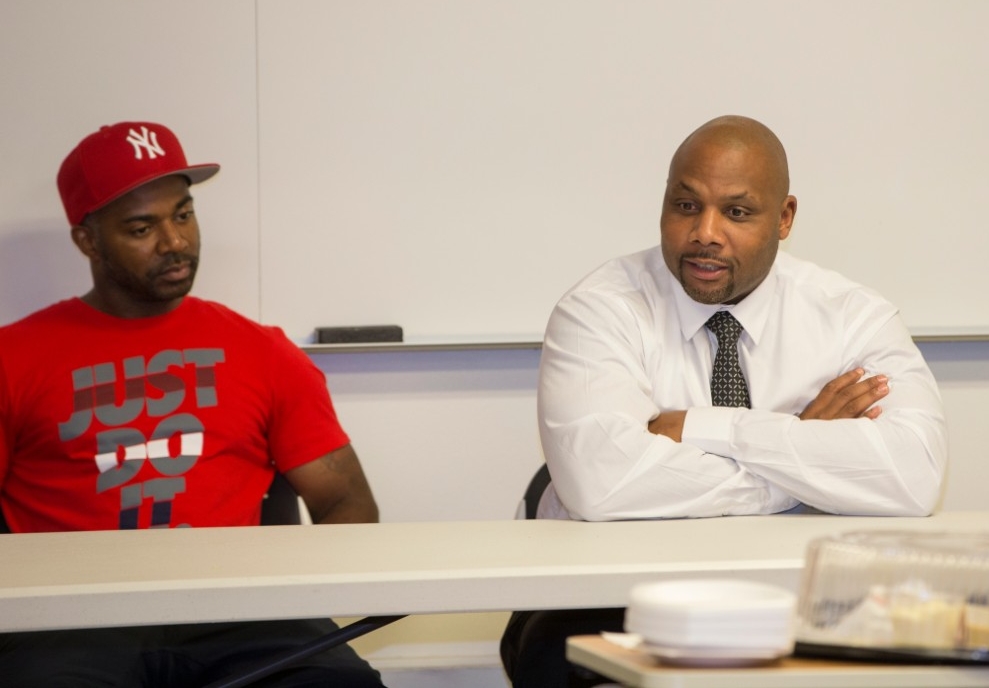
Laurese Glover, left, and Christopher Miller talk to UC students about their ordeals in proving their innocence. They were freed with help from UC's Ohio Innocence Project.
"Sometimes I open it just because I can."
‒ Exoneree Laurese Glover on the simple pleasures of checking the fridge after his release from prison.
The Ohio Innocence Project was the creation of Cincinnati Mayor John Cranley, attorney William Gallagher and UC law professor Jack Chin. UC law professor Mark Godsey, a former federal prosecutor and author of the 2017 book “Blind Injustice," is now its director. In its book review, Salon called Godsey “an American superhero.”
Godsey invited the speakers this week to help his toiling students remember that their cases affect real people. Most of the exonerees are dedicated to helping each other cope with their new lives and to freeing others who share their predicament.
“I’ve heard it referred to as a circumstantial fraternity,” UC law student Dana Musial said.
Musial said many of her classmates enrolled at UC’s College of Law for the chance to work on Ohio Innocence Project cases. Godsey tells students about the fallibility of the justice system and how to look for common pitfalls of inadequate defenses or prosecutorial overreach.
“I always knew that human error plays a part,” Musial said. “I’ve always been a skeptic of the justice system. It’s not perfect, but I didn’t know how imperfect it is.”
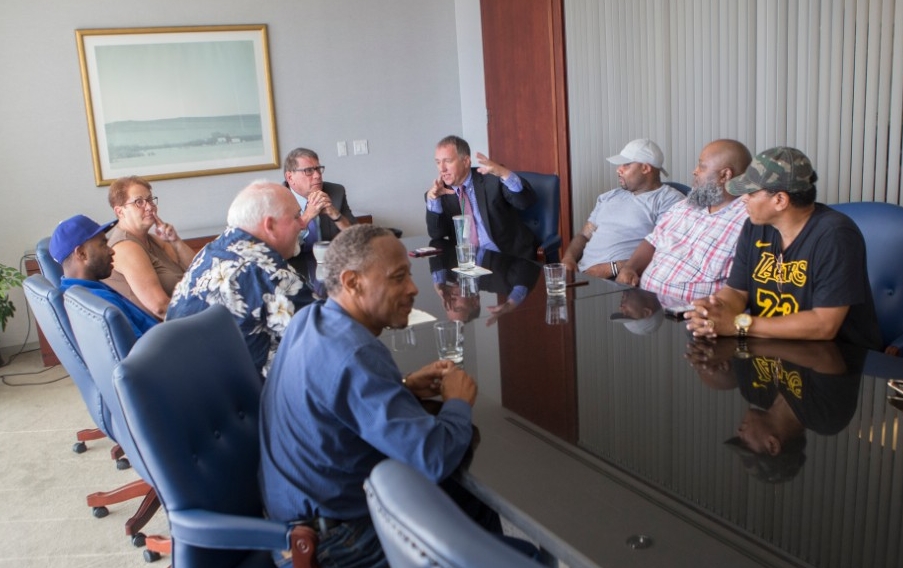
Exonerees in UC's Ohio Innocence Project meet with Ohio Rep. Bill Seitz, R-Cincinnati, to talk about reforms that could help the wrongfully convicted rebuild their lives.
The shortcomings of the justice system were on display when Laurese Glover and Eugene Johnson were convicted of the 1995 shooting death of 19-year-old Clifton Hudson in East Cleveland. Each was sentenced to 15 years to life in prison. UC’s lawyers faulted the reliability of gunshot residue tests and called into question conflicting witness testimony. A judge also determined that prosecutors suppressed evidence and concealed public records. The two were released on bond in 2015 pending a new trial.
After being freed, Glover said he wore a monitoring bracelet on house arrest for months awaiting retrial.
“My aunt said, ‘You probably feel like you’re still locked up,’” Glover told the UC students. “But no, I was just happy to be able to open the refrigerator whenever I wanted. Sometimes I open it just because I can. I don’t even want anything.
“You appreciate the small things in life.”
Eventually, prosecutors dropped all charges. Finally they were free.
“My faith and spirituality is what go me through all of this. And the Ohio Innocence Project. I wouldn’t be here without them.”
‒ Clarence Elkins, who was exonerated after serving more than six years in prison.
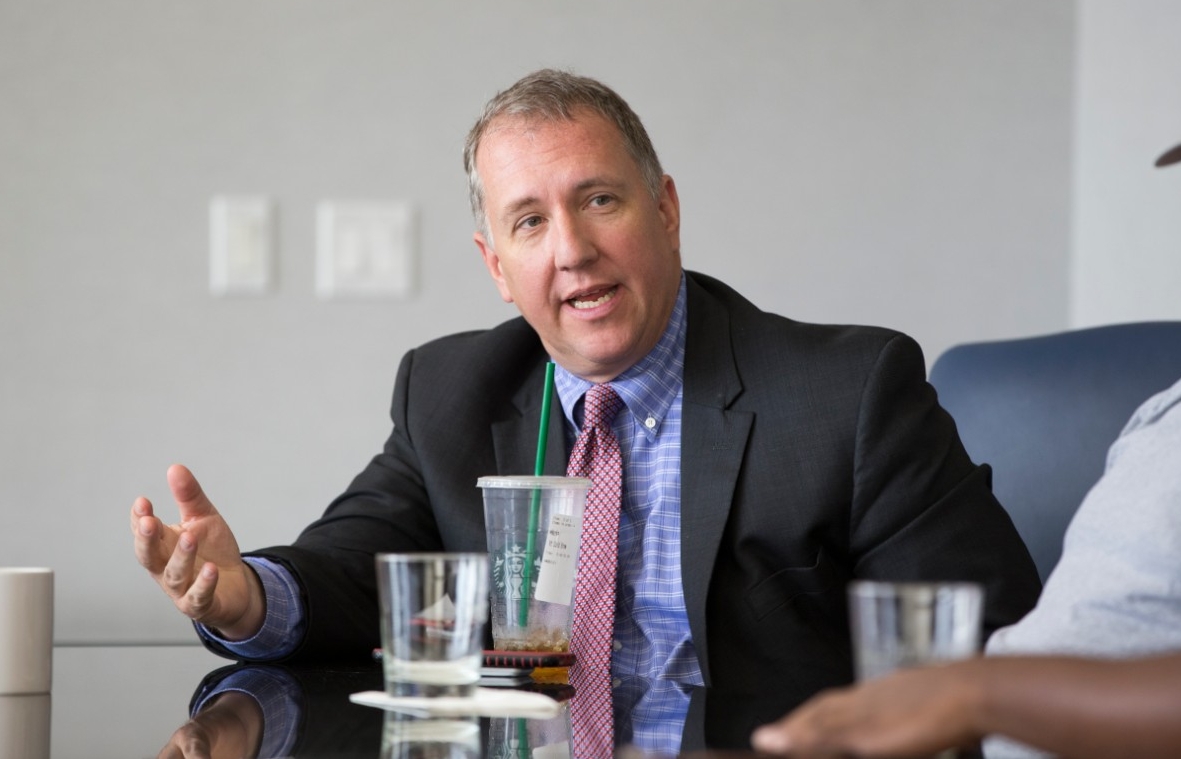
UC College of Law professor Mark Godsey talks to Ohio Rep. Bill Seitz, R-Cincinnati about criminal justice reforms that could help those exonerated after wrongful convictions.
Clarence Elkins, 55, was convicted in 1999 of the beating death of his 68-year-old mother-in-law, Judith Johnson, and the beating and rape of his 6-year-old niece. He spent more than six years in prison before he was exonerated with help from UC. He was convicted largely on the testimony of his traumatized niece, who told police the attacker resembled her Uncle Clarence.
Elkins’ now ex-wife, Melinda, suspected that a convicted sex offender named Earl Mann was the culprit. Mann lived next door to her mother. Incredibly, Elkins wound up on the same prison cell block as Mann following Mann's conviction on three unrelated assaults on children.
“What is the chance that he did this crime I was convicted of?” Elkins asked.
Elkins secretly collected a half-smoked cigarette from Mann that provided DNA that matched evidence collected by investigators in Elkins’ criminal case. He hid the cigarette for a month in the pages of his Bible concordance under “M” – near the entry on Moses – until he could smuggle it out of the prison to his lawyer.
Godsey presented a persuasive case that prosecutors had convicted the wrong suspect. Prosecutors reopened the investigation and used polygraph examinations to pick apart Mann’s story. Mann is now serving a life sentence after confessing and pleading guilty to killing Johnson and assaulting the little girl.
“My faith and spirituality is what go me through all of this. And the Ohio Innocence Project. I wouldn’t be here without them,” Elkins said.
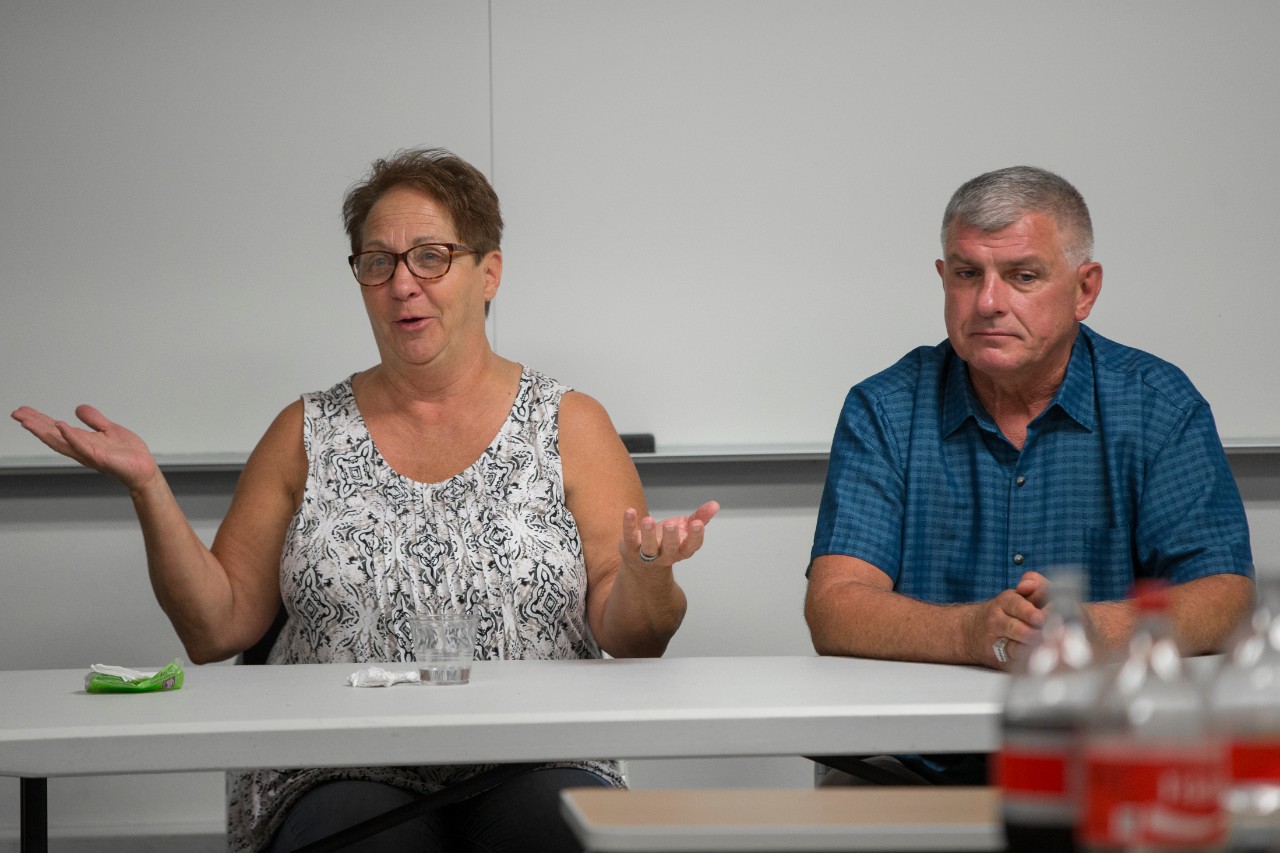
Wrongfully convicted defendants Nancy Smith, left, and Clarence Elkins share their harrowing experiences with UC College of Law students.
Another exoneree, bus driver Nancy Smith, was convicted in 1993 of molesting two preschoolers who rode her Head Start bus.
The children, ages 4 and 5, and their parents told police she took them to the Lorain, Ohio, apartment of Joseph Allen where the children said they were sexually violated. Smith and Allen said they had never met and denied harming any children.
UC’s lawyers persuaded an Ohio judge that the accusations were a fiction created by parents who filled in details from their own overheated imaginations at a time when nightmare news stories of molestation among day-care centers created a national panic. Investigators say the interviews of the children used improper techniques with leading questions and parental interference that created a false narrative implicating Smith and Allen.
It didn’t matter that the bus odometer showed Smith had taken her normal route or that the day-care center's attendance records showed the children were in class when the alleged crimes occurred. There was no physical evidence the children had been harmed. The testimony of the parents and preschoolers alone was enough to keep Smith in prison for 15 years before an appellate judge concluded she was innocent.
“I probably cried myself to sleep every night the first year,” Smith told the UC students. “I remember getting on my knees and praying, ‘Why, God, did he allow this to happen to me?’ How was I going to get out of here?”
Smith said the families of prisoners who are wrongfully convicted suffer as well.
“The visits with family would get me through a month,” she said.
“To watch them walk out the door was devastating, not just for me but for my children,” Smith said. “My son said, ‘I can’t come to see you anymore. I can’t leave you there. It kills me every time.’ I didn’t realize the struggle I was living in prison my children were living, too.”
Today, Smith said she has difficulty trusting people, which has made it hard to form relationships. But she counts her blessings.
“I did 15 years, but it wasn’t 30. It wasn’t 90. So I’m grateful every day,” she said.
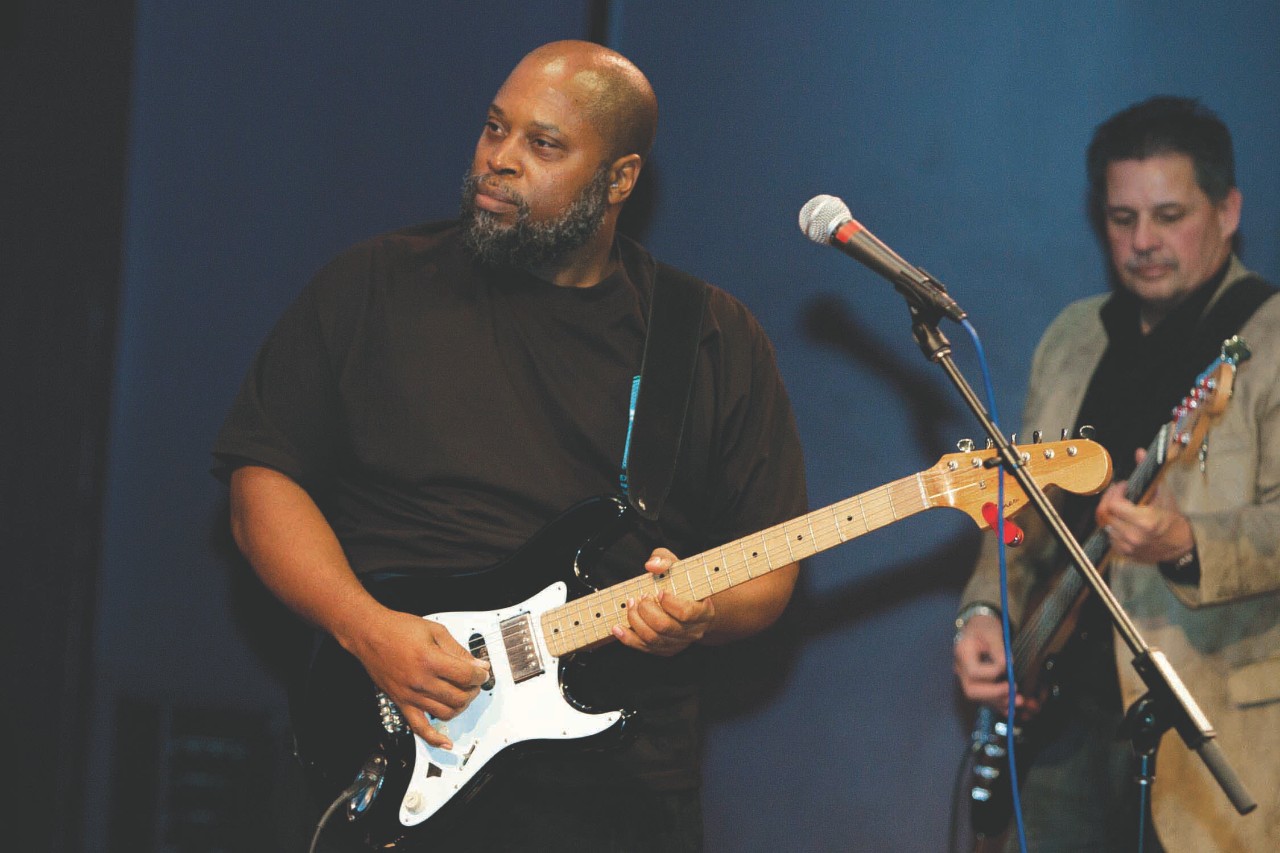
Raymond Towler plays lead guitar in the Exonerees Band, made up of musicians around the country who were wrongfully convicted of crimes. (Provided)
Exonerees said being convicted of a crime you did not commit is a living nightmare. Towler spent countless moments in prison wondering if he could have said or done anything that might have proven his innocence.
“It’s a question I asked myself a million times. I don’t think I could have done anything,” he said. “I had an alibi, character witnesses. But it’s like a freight train coming at you.”
When he was finally freed after nearly three decades, he spent a sleepless night staring at the ceiling at his brother’s house. The next morning, the sun was shining.
“It was May, almost summer. I wanted to go for a walk outside, but I had never opened a door by myself in 30 years,” Towler said. “All the prison doors were always locked. I looked at the doorknob, but I couldn’t touch it.
“I was still locked mentally,” he said. “It took me a week before I could go anywhere by myself. When I took my first walk by myself, it was nice and peaceful. I didn’t have to answer to anybody. I could have walked for miles.
“That’s when I appreciated all I went through and survived.”
Towler is a musician who studied art in community college before his arrest. He spent his days in the noisy prison drawing and painting and sent hundreds of finished works home for safekeeping. His art spoke to his mindset at the time, he said. One Salvador Dali-inspired piece showed clocks melting under a baking desert sun.
“Time was melting away,” Towler said. “I had this heinous crime like a black cloud over my head all these years.”
After his release, he joined a band made up of other exonerees around the country. He plays lead guitar. They booked a gig at at the annual SoberFest in Lorain, Ohio, on Aug. 4.
“We call ourselves The Exoneree Band,” Towler said.
Towler calls art his first love. His prison artwork has received critical praise and hangs in the Soap Gallery in Youngstown, Ohio. Even the assistant warden at the prison bought a piece. Lately, Towler has taken up photography. But he doesn’t paint anymore.
“When I sit down to paint, I hear the prison doors slam,” he said. “I’m still working on that.”
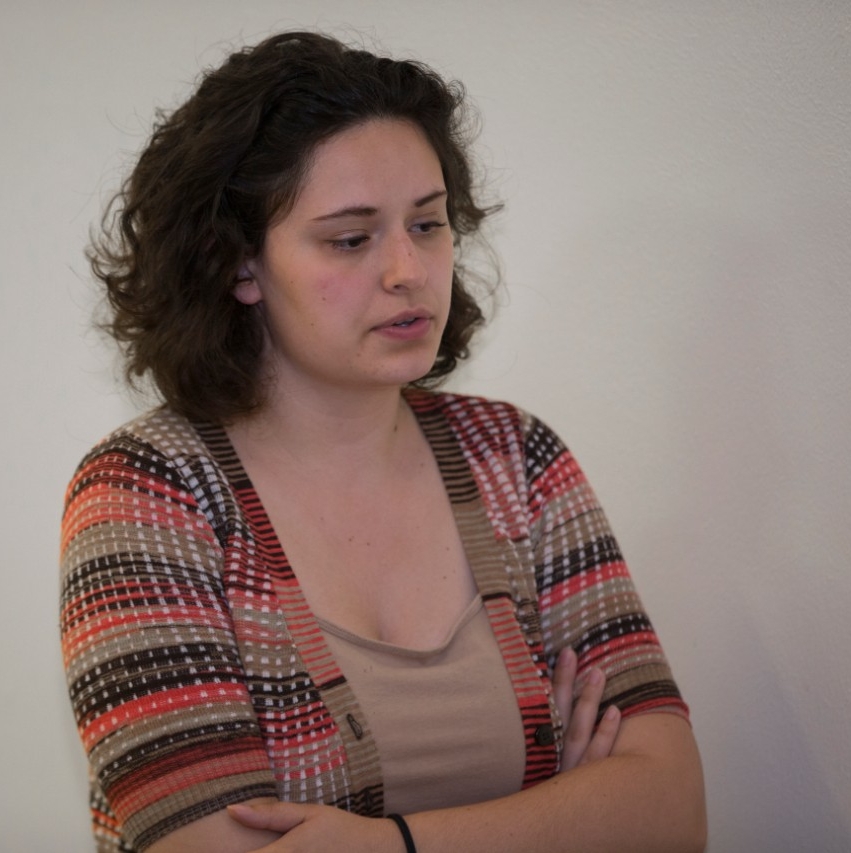
UC student Dana Musial
“I’ve heard it referred to as a circumstantial fraternity.”
‒ UC College of Law student Dana Musial on defendants freed with help from UC's Ohio Innocence Project
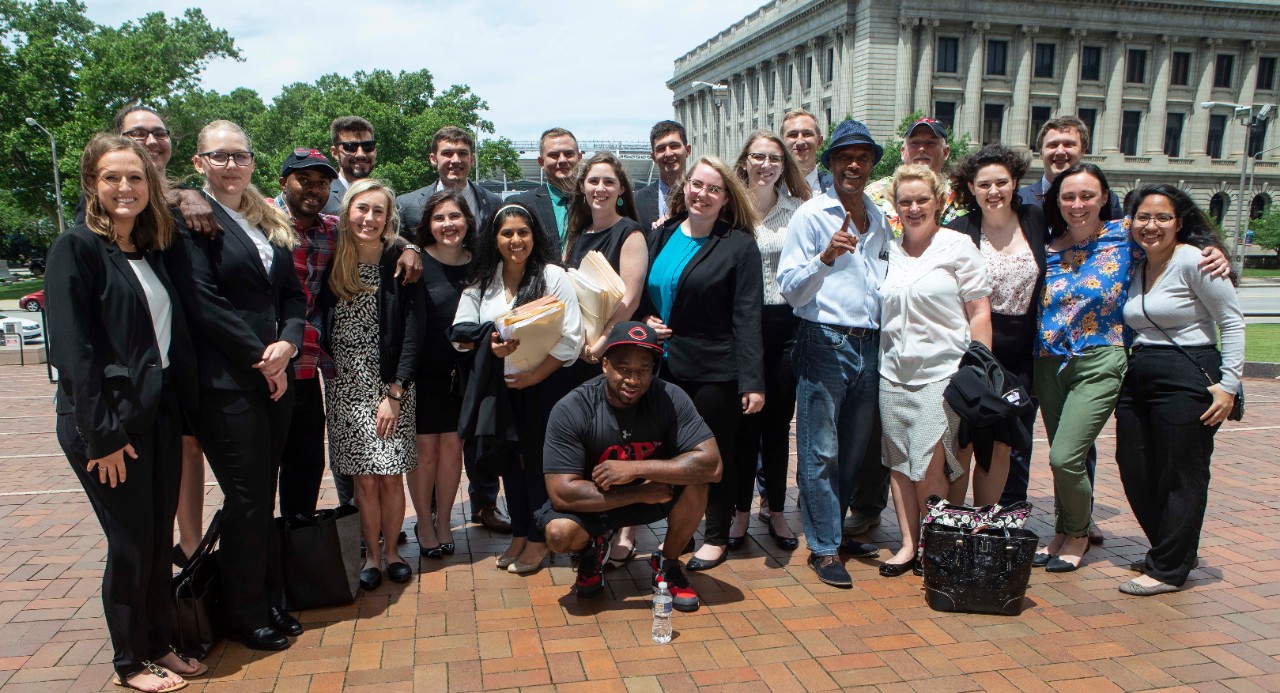
UC College of Law students pose outside the Cuyahoga County Justice Center with some of the people they have helped exonerate as part of UC's Ohio Innocence Project.
Make a difference
Do you envision a future where you use your law degree to help others? Take the first step by exploring your options at the University of Cincinnati College of Law. You can also support the OIP financially with an online gift.

